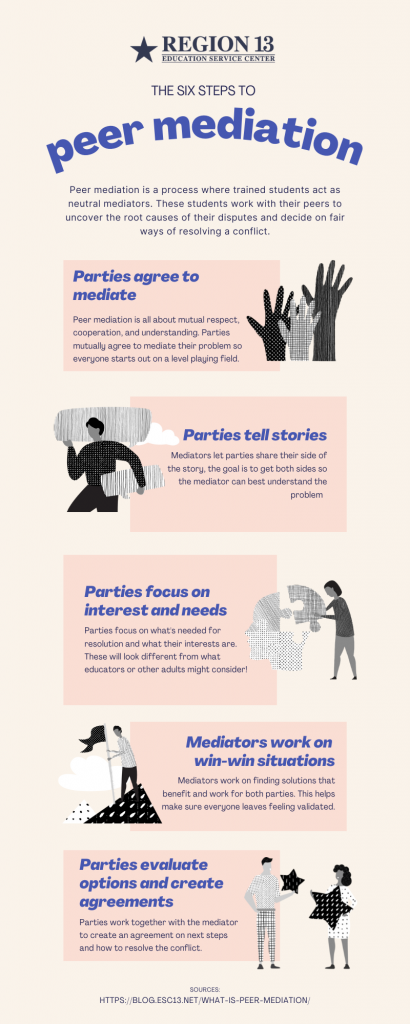Peer mediation is a process where trained students act as neutral mediators. These students work with their peers to uncover the root causes of their disputes and decide on fairways of resolving a conflict. The process is great because it’s a form of restorative discipline, and helps students build their empathy while they also fine-tune their problem-solving skills.
You’ve heard the phrase “judged by a jury of your peers,” plenty of times in your life. It’s a fundamental part of our judicial system: our judgment will be handed down by people just like us. However, for many students, that same system doesn’t apply. Students often get “judged” and “sentenced” by people much older than them. Peer mediation seeks to change that.
As an added bonus, peer mediation helps switch a campus’ disciplinary focus from punishment to conflict resolution. The harsh truth is that for the vast majority of conflicts between students, punishment doesn’t need to be severe. Your students are growing and learning new skills every day. Just like you get into fights, scuffles, or conflicts with your coworkers, friends, and family, students do too! Also just like you, your students are perfectly capable of coming up with their own forms of resolution that aren’t punishment-based.
The six steps of peer mediation
A typical peer mediation session will generally break down into six distinctive steps:
- Parties agree to mediate
- Parties tell their stories
- Parties focus on interests and needs
- Mediators work on creating win-win situations
- Parties evaluate options
- Parties create an agreement

Step One: Parties Agree to Mediate
This is crucial. The peer mediation process is all about mutual respect, cooperation, and Understanding. Nobody is “forced” into the situation, instead, parties mutually agree to mediate their problem so everyone starts out on a level playing field.
Step Two: Parties Tell their Stories and the Mediator Gathers Points of View
Mediators will let parties tell their sides of the story. If you’ve ever been in a restorative circle, you’ll notice some similarities. The goal is to get both sides of the story so the mediator can best understand the problem.
Step Three: Focusing on Interests and Needs.
Next, the students focus on what’s needed for resolution and what their interests are. These will likely be different than what we as teachers, educators, or just adults might consider!
A student might not have a need for punishment or “justice” like you or I might. Instead, they may simply want an apology, or just need to have their voice heard.
Step Four: Mediators Work on Creating Win-Win Situations.
The goal of peer mediation is to create situations where everybody wins and one party doesn’t feel as if they got unfairly penalized. In typical punishment scenarios, either one party gets punished while the other doesn’t, or both parties get punished regardless. This leads to increased feelings of animosity and hostility.
Step Five: Evaluate Options
In typical disciplinary settings, a student has few, if any, options of what type of punishment they’d like to receive. During peer mediation, students learn that in most scenarios in their life they’re going to have a wide range of options they can choose from to solve their problems.
Rather than default to punishment, peer mediators and students in conflict will talk together about what seems fair. Maybe a simple apology is all it takes?
Step Six: Create an agreement
Students, with help from the peer mediator, create an agreement that satisfies both parties. Since both people created the agreement, they usually leave happier and feel more fulfilled.
The beauty of peer mediation is that it allows districts and campuses to resolve the day-to-day conflicts that might overwhelm staff members while also teaching students valuable life skills. It also encourages campuses, and students, to think of proactive and restorative ways of handling their behavior issues, rather than defaulting to punishment.
Learn more about bringing a peer mediation program to your campus!
Angela has 24 years of experience in education. She has been in her current position for 12 years. Angela has trained and provided coaching support to over 200 campuses for PBIS. She is also a certified Restorative Practices coordinator. She is a trainer for Interventions, Coaching Classroom Management, CHAMPS, and Why Try.






Add comment